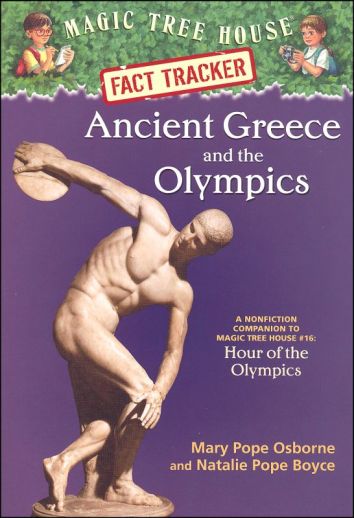We use cookies to make your experience better. To comply with the new e-Privacy directive, we need to ask for your consent to set the cookies. Learn more.
Ancient Greece & the Olympics (MTH Rsch Gde)
What is a "unit study"? Briefly, it's a thematic or topical approach to teaching as opposed to the traditional by-subject approach. Rather than teach each subject separately, a unit study attempts to integrate many or all subject areas into a unified study - usually centered around a particular subject or event. Obviously History (the study of events) and Science (the study of "things") are well-suited to unit studies, and usually form the "core" around which other subjects are integrated. Subjects like Bible, Geography, Government, English (writing), and Reading/Literature, Music, Home Economics, Life Skills, and Art, are usually easy to integrate around a core topics. Remaining subjects (Math, Phonics, Grammar, Spelling) can be integrated to some extent via related activities. Each, however, has its own "system" (progression of skills, mastery of "rules") which must be followed to some degree. Since one of the additional advantages of a unit study curriculum is the ability to use it with students of varying ages and skill levels, these subjects are generally taught apart from the core curriculum. This may be as simple as assigning pages in a grammar or spelling book, or using a separate "program" for Phonics and Math. Unit studies also tend to be more activity-oriented than the traditional approach, a real boon to kinesthetic learners. Advocates of the unit study approach site studies showing that children learn best when learning is unified rather than fragmented and when learning is more participatory than passive.
These are not complete unit studies, but are components that will allow you to extend the usefulness of these books into other subject areas.
Research guides are available for quite a few of the books in the Magic Tree House series. These guides are digest-sized and similar in format to the books. However, they are non-fiction and aim to teach children more about the topic touched upon in the book. For example, in the book Mummies in the Morning, Jack and Annie travel to Ancient Egypt and help the ghost of Queen Hutepi find her book of the dead so she can continue on into the afterlife. In the companion research guide, Mummies and Pyramids, the chapters detail Ancient Egypt, everyday life, Egyptian religion, mummies, Egyptian funerals, the age of pyramids, tomb treasures and tomb robbers, the most famous mummy of all, and gifts of the pyramids and mummies. The chapters are written in simple language for children, yet they provide readers with a wealth of knowledge. These chapters are slightly longer than the ones in the books, and Jack and Annie are still present in the illustrations and to provide small tidbits of information to readers. The guides have more pictures than the books do, with photos and pictures of important objects. At the end of each guide are a few pages to guide students in further research of the topic. Entertaining and informative, these guides aim to capture the interest of the reader while opening the door to further study. Please note that some of the guides may contain some evolutionary material; for example, the Space research guide talks about the birth of the universe, and the guide states that "while no one know for sure what happened, many scientists believe in the Big Bang Theory..." etc, but mostly they are just factual guides. - Melissa
| Product Format: | Softcover Book |
|---|---|
| Brand: | Random House |
| Grades: | 1-5 |
| ISBN: | 9780375823787 |
| Length in Inches: | 7.5 |
| Width in Inches: | 5.25 |
| Height in Inches: | 0.25 |
| Weight in Pounds: | 0.3 |

